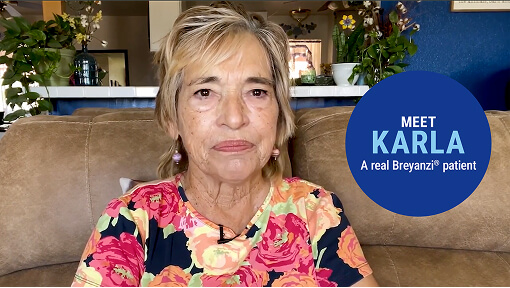
Get back to what matters. The initial side-effect monitoring requirements for Breyanzi have been shortened. Learn more.

For people with relapsed/refractory:
- Large B-cell lymphoma (2L+ LBCL)
- Chronic lymphocytic leukemia (3L+ CLL)
- Small lymphocytic lymphoma (3L+ SLL)
- Follicular lymphoma (3L+ FL)
- Mantle cell lymphoma (3L+ MCL)
- Marginal zone lymphoma (3L+ MZL)
See full list of indications below under the Important Facts About BREYANZI.

Breyanzi is a one-time infusion* made from your own white blood cells (T cells)
*The full treatment process includes blood collection, chimeric antigen receptor (CAR) T-cell creation, possible bridging therapy, low-dose chemotherapy, CAR T-cell infusion, and short-term and long-term monitoring for side effects. Manufacturing results may vary.
START TODAY FROM WHEREVER YOU ARE WITH YOUR TREATMENT†
HOW IS BREYANZI CAR T-CELL THERAPY DIFFERENT?

CAR T-cell therapy is a personalized treatment that uses your white blood cells (T cells) to find and fight cancer.
IS BREYANZI RIGHT FOR YOU?

Breyanzi may be an option in the treatment process sooner than you think.
WHAT SUPPORT IS AVAILABLE FOR BREYANZI PATIENTS?

Cell Therapy 360® offers assistance programs to help patients and their care partners throughout their treatment journey.
HOW DOES THE CAR T PROCESS WORK?

Learn about the steps in the treatment process from collection to infusion.
WHAT HAVE OTHER PEOPLE EXPERIENCED WITH BREYANZI?

Read stories from real Breyanzi patients.
†Breyanzi is indicated for second-, third-, or later-line treatment for relapsed or refractory lymphoma.
2L+=second or later line; 3L+=third or later line.
SEE HOW REAL PATIENTS FOUND HOPE WITH BREYANZI

See How Astrid Discovered Breyanzi After Her First Treatment Failed
Astrid, a busy physician assistant and mom, had her life interrupted by a huge pressure in her chest. She visited the ER and soon was diagnosed with non-Hodgkin large B-cell lymphoma. After her first round of chemotherapy failed, her doctor recommended CAR T-cell therapy. Astrid began treatment with Breyanzi, a prescription medication used to treat certain types of non-Hodgkin lymphoma.

Discover How Karla and Her Doctor Decided to Try Breyanzi After Her First Treatment Failed
Karla, a vibrant 73-year-old, was always on the go. When she was first faced with her cancer diagnosis, she was determined to win the fight, and she did. However, almost a year after achieving remission, Karla received devastating news: Her cancer had returned. Reluctant to undergo chemotherapy again, her oncologist introduced her to CAR T therapy.

Setting Sail to Remission: Dan’s Lymphoma Journey
A lifelong dream of buying a boat in retirement was put on hold for Dan when a lump on his neck led to a diagnosis of non-Hodgkin lymphoma. After two unsuccessful rounds of chemotherapy, his cancer continued to spread. Dan found a new path forward by joining a clinical study for Breyanzi, an innovative treatment that used his own blood to fight the cancer.
Patients and caregivers have been compensated by Bristol Myers Squibb for sharing their story. Individual results may vary.




